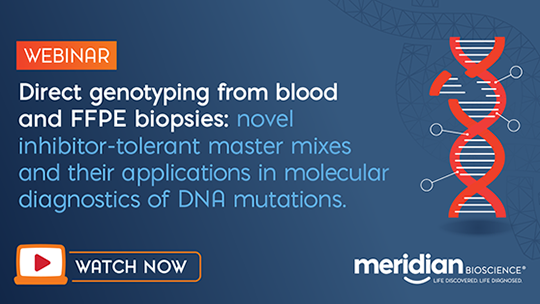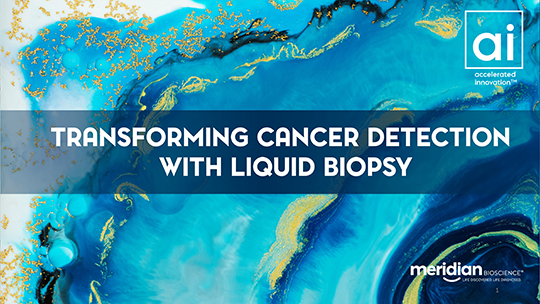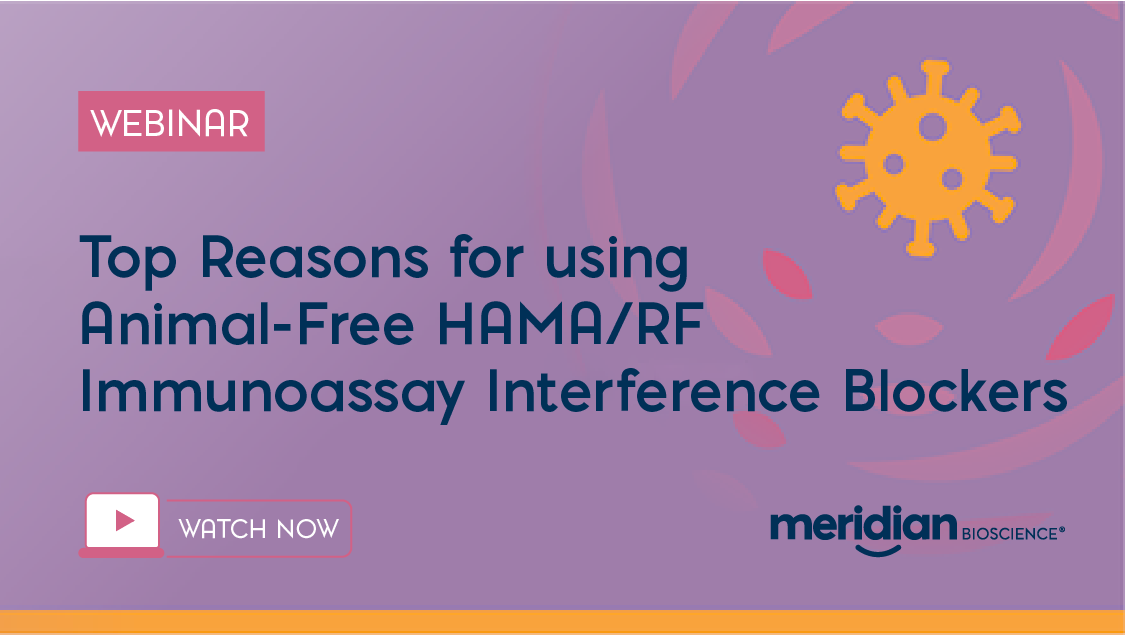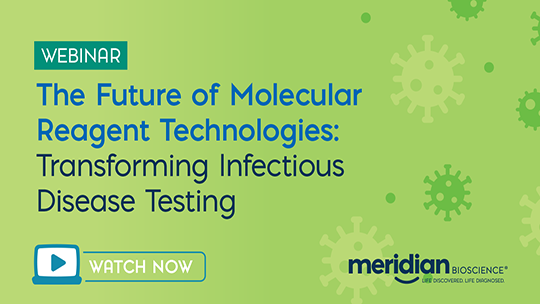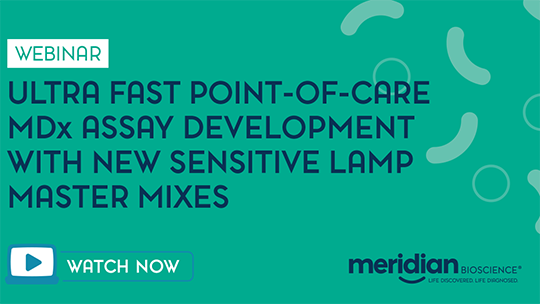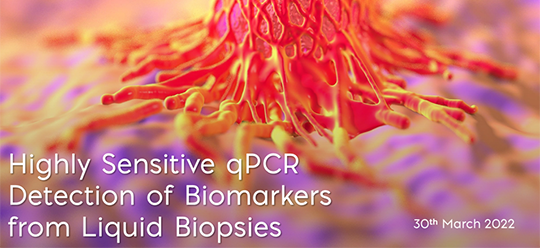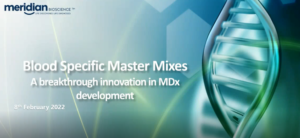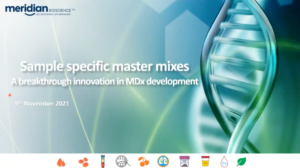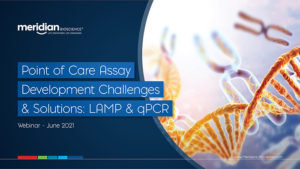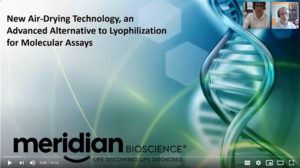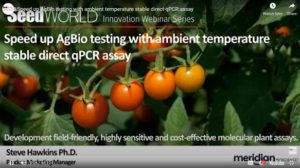Life Science Webinars
Direct Genotyping from Blood & FFPE Biopsies: Novel Inhibitor-Tolerant Master Mixes & Their Applications in Molecular Diagnosis
DNA genotyping is a powerful technology that allows the identification of genetic variations that can lead to an increased risk of developing certain diseases. Additionally, genotyping has a fundamental role in companion diagnostics, as it enables the characterization of patients’ genetic profiles that can be used to guide treatment decisions.
Here, we will introduce two novel master mixes developed to provide PCR-based identification of mutations directly from the clinical samples, such as blood, plasma or FFPE tissue, bypassing DNA extraction and streamlining the analysis of both liquid and tissue biopsies.
Speakers:
Mihai-Nicolae Podaru, PhD (R&D Senior Scientist, Meridian Bioscience)
Moderator:
Steve Hawkins, PhD (Product Marketing Manager, Meridian Bioscience)
Transforming Cancer Detection with Liquid Biopsy
Liquid biopsy is fast becoming the method of choice for cancer diagnosis in the field of precision medicine, allowing oncologists to choose a targeted therapy, monitor treatment resistance and detect minimal residual disease, without patients undergoing an invasive procedure. Liquid biopsy utilizes bodily fluids such as blood, stool, urine and saliva to detect cancer biomarkers earlier than conventional methods such as tissue biopsy. It is also useful to screen for drug-resistant subpopulations, micro-metastases, minimum residual disease and disease relapse. The non-invasive approach of liquid biopsies enables samples to be taken easily and repeatedly over the course of a patient’s treatment, overcoming the inherent shortcomings and risks of surgical tissue biopsies. This panel discussion will review how liquid biopsy is opening up new avenues in cancer detection and continuous monitoring for personalized cancer treatment, as well as the screening of cancer markers for therapeutic resistance. Four industrial leaders in the field of molecular diagnostics will come together to discuss the current status of liquid biopsy for cancer screening, as well as how modern technologies are changing the landscape of cancer detection and CDx.
Panelists:
Chris Sale (CEO, Nonacus, UK)
Shidong Jia, PhD (CEO, Predicine, USA)
Hongjun (Harry) Yang, PhD (Senior VP of CDx, DiaCarta, USA)
Florent Chang-Pi-Hin PhD (VP of R&D, Meridian Bioscience, USA)
Moderator:
Steve Hawkins, PhD (Product Marketing Manager, Meridian Bioscience)
Top Reasons for Using Animal-Free HAMA/RF Immunoassay Interference Blockers
Immunoassay interference can cause false-positive and false-negative test results, leading to misinterpretation and improper patient diagnosis. The most common causes of interference are due to Human Anti-Mouse Antibodies (HAMA), Rheumatoid Factor (RF), and Heterophilic Antibodies (HA). HAMA are the most prevalent and are identified in up to 25% of the patient population. Combined with HA, they represent the most significant factors leading to false positive immunoassay results.
Avoiding immunoassay interference requires blockers to be included in every immunoassay. Historically, animal-based interference blockers have been used to improve assay accuracy; however, they are susceptible to cross-reactivity with assay reagents, lot-to-lot variability, and supply shortages – as seen during the COVID-19 pandemic. Meridian’s new animal-free commercial blockers, K-BlockTM and Mouse-FREE IgG, are the next-generation solution for blocking HAMA/RF/HA that overcomes the ethical concerns and supply problems in using animal-derived blockers.
In this webinar you will learn the advantages of using animal-free immunoassay blockers and their performance.
Speakers:
Ryan Hughes Ph.D., (Life Science Immunology Product Manager, Meridian Bioscience)
Andy Gaspar Ph.D., (Life Science Technical Operations and Development Manager, Meridian Bioscience)
Moderator:
Steve Hawkins, PhD (Product Marketing Manager, Meridian Bioscience)
The Future of Molecular Reagent Technologies: Transforming Infectious Disease Testing
The molecular diagnostic approach for infectious disease such as STDs, tropical, and respiratory disease has seen significant development in the past twelve months, driven by a demand for better, faster, higher sensitivity assays, that can detect asymptomatic carriers. Traditionally, lab-based tests using blood samples have been the mainstay for molecular testing, however home-based, extraction-free tests, using alternative sample types (saliva, urine, stool) are now highly sought after, but pose significant challenges in assay development for both lab-based and point of care (POC) applications.
In this webinar you will learn about:
- New nucleic acid amplification chemistries that simplify direct detection
- Optimizing assay performance per sample types (e.g. blood, saliva, urine, stool)
- The latest technologies that can reduce your cold-chain management
Presenters
Michele Amasio, Ph.D.
Research and Development Senior Manager
Steve Hawkins
Ph.D. – Product Marketing Manager
Ultra-fast Point-of-Care MDx development with new, sensitive LAMP master mixes
The COVID-19 pandemic accelerated the adoption of point-of-care molecular technologies that offer quick sample to results, high sensitivity, lower cost and widespread accessibility.
This webinar will cover new market-leading reagent solutions for loop-mediated isothermal amplification (LAMP) assays, which simplify assay development, speed up assay turnaround time, and deliver highly sensitive and specific amplification without DNA or RNA extraction.
Presenters
Elda Iljazi Ph.D.
Senior Scientist Meridian Bioscience
Highly sensitive qPCR detection of biomarkers from liquid biopsies
Liquid biopsy is a non-invasive alternative to tissue biopsy based on ultra-sensitive detection of tumor-derived material such as ctRNA and ctDNA from biofluids, including blood, urine, stool, saliva, and sputum. qPCR based liquid biopsy possesses several advantages in cost and throughput, when compared to other technologies like NGS and ddPCR. In this talk, we will discuss Meridian’s new advances in inhibitor tolerant qPCR based liquid biopsy, that reduces the cost and complexity of these assays, while enabling ultra-sensitive detection from very low concentration cancer markers.
Presenters
Steve Hawkins
Ph.D. – Product Marketing Manager
Michele Amasio, Ph.D.
Research and Development Senior Manager
Meridian’s solution to detecting DNA or RNA directly from whole blood
Direct qPCR has many advantages over traditional qPCR workflows that involve DNA/RNA extraction. However, achieving high sensitivity with direct qPCR using whole blood samples has been challenging due to the presence of qPCR inhibitors within the sample (such as heme, salts, and proteins), and preservatives or anti-coagulants that are added during the sample collection process. The inhibitors can negatively impact the performance of the enzymes used in qPCR and RT-qPCR and they limit the amount of sample that can be added to the reaction, overall reducing the assay sensitivity and accuracy. In this talk, we will be discussing Meridian’s novel solution to overcome PCR inhibitors in direct qPCR and RT-qPCR, enabling greater sensitivity for direct detection from whole blood, improving assay reproducibility, and reducing assay development time.
Presenters
Thomas Fouqueau, PhD
Acting Team Leader, R&D, Meridian Life Science
Rachel Currier, PhD
Acting Team Leader, R&D, Meridian Life Science
Meridian Sample Specific Master Mixes – Breakthrough Innovation in MDx Development
Traditionally, qPCR and RT-qPCR diagnostic assays include DNA/RNA extraction and purification steps to remove inhibitors from the PCR reactions, to meet the assay specificity and sensitivity. However, these steps are laborious, expensive, and time-consuming. To overcome this, Meridian has developed inhibitor tolerant mixes specifically for blood, saliva, urine, and stool. Meridian’s Direct Sample-Specific qPCR Mixes are the first mixes on the market overcoming the limitations of inhibitors inherent in the various clinical specimens, for ultimate assay sensitivity and specificity.
In this webinar our speakers will discuss:
The optimization strategy and methodology that have led to the development of these specimen-specific mixes, which have superior performance compared to other products on the market and enable faster, more sensitive, and cost-effective diagnostic assays.
Speakers:
Dr. Rachel Currier- Acting Team Leader, Research & Development
Dr. Thomas Fouqueau- Acting Team Leader, Research & Development
Moderator
Dr. Steve Hawkins, Product Marketing Manager
Point of Care Assay Development Challenges and Solutions: LAMP vs. qPCR
Molecular point of care (POC) tests are rapidly gaining traction in the diagnostic market, especially for infectious diseases. While LAMP and qPCR testing share common advantages such as quick turnaround time and high sensitivity and specificity, LAMP has additional benefits, making it possible for testing to be carried out essentially anywhere – from an airport to school, to a remote medical clinic.
In this webinar you will learn about:
- The new advances in the LAMP and qPCR assay development for POC
- How to speed up sample-to-result and eliminate the need for cold-chain management
Speakers:
Elda Iljazi, Ph.D. – R&D Senior Scientist, Meridian Bioscience
Dr. Michele Amasio – Research and Development Manager
New Air-Dryable Technology, an Advanced Alternative to Lyophilization for Molecular Assays
qPCR and RT-qPCR are widely used in the development of molecular diagnostic assays with applications in human diagnostics, animal health, environmental, plant and food testing.
Lyophilization is a common technique used for creating ambient temperature stable PCR assays. However, the process is time consuming, complex to optimize and requires expensive equipment. Meridian’s new air-dryable technology replaces lyophilization with a fast, simple, and inexpensive oven-drying process, making it ideal for manufacturing room-temperature stable, highly sensitive and cost-effective molecular diagnostic assays.
This webinar will cover:
- How Meridian’s new air-dryable technology compares to traditional lyophilization
- The impact of the air-drying process on qPCR performance
- The combination of air-drying with inhibitor tolerance technology in qPCR assays
Presenters:
Dr Steve Hawkins – Product Marketing Manager
Dr Michele Amasio – Research and Development Manager
Introducing a new advancement in AgBio assay development for creating field-friendly, highly sensitive and cost-effective molecular plant assays.
This webinar will cover:
- Create ambient temperature stable assays without the need for lyophilization
- Simplify workflow with direct qPCR for crude plant lysates
- Improve assay sensitivity for better LOD
- Quantify the presence of GMOs more accurately
- Speed up sample to results
Presenter:
Dr Steve Hawkins – Product Marketing Manager
Meridian is the complete solution
Meridian offers diagnostic manufacturers the complete solution with over 3,000 antigens and antibodies covering more than 500 diseases and an extensive range of specialty qPCR/RT-qPCR master mixes and molecular enzymes all manufactured under ISO13485 regulations.
MeridianSmartSearch
Get In Touch With A Specialist
Have questions about a product? Want to learn more about Meridian’s molecular or immunoassay reagent portfolio? We want to hear from you!
